
Horace Julian Bond was an American social activist, leader of the civil rights movement, politician, professor, and writer. While he was a student at Morehouse College in Atlanta, Georgia, during the early 1960s, he helped establish the Student Nonviolent Coordinating Committee (SNCC). In 1971, he co-founded the Southern Poverty Law Center in Montgomery, Alabama, and served as its first president for nearly a decade.

The Edward Via College of Osteopathic Medicine (VCOM) is a private medical school on the campus of Virginia Tech in Blacksburg, Virginia, with branch campuses in Spartanburg, South Carolina, Auburn, Alabama, and Monroe, Louisiana. VCOM also recently added Bluefield University to its list of campuses. Founded in 2002, VCOM graduated its first class of 139 students in June 2007.
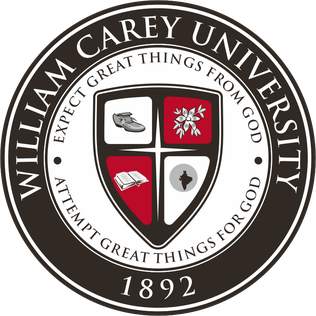
William Carey University is a private Christian university in Mississippi, affiliated with the Southern Baptist Convention and the Mississippi Baptist Convention. The main campus is in Hattiesburg, and a second campus is in the Tradition community north of Biloxi.

Des Moines University (DMU) is a private medical school in West Des Moines, Iowa. Founded in 1898, Des Moines University is the second oldest osteopathic medical school and the fifteenth largest medical school in the United States. DMU's three colleges—the College of Osteopathic Medicine, College of Podiatric Medicine and Surgery, and College of Health Sciences—offer nine academic degrees, including master's and doctorate degrees.
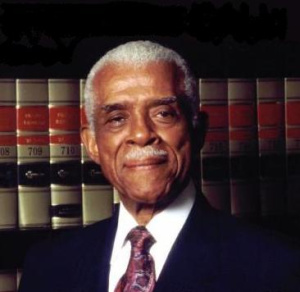
Donald Lee Hollowell was an American civil rights attorney during the Civil Rights Movement, in the state of Georgia. He successfully sued to integrate Atlanta's public schools, Georgia colleges, universities and public transit, freed Martin Luther King Jr. from prison, and mentored civil rights attorneys. The first black regional director of a federal agency, Hollowell is best remembered for his instrumental role in winning the desegregation of the University of Georgia in 1961. He is the subject of a 2010 documentary film, Donald L. Hollowell: Foot Soldier for Equal Justice.

Joseph Echols Lowery was an American minister in the United Methodist Church and leader in the civil rights movement. He founded the Southern Christian Leadership Conference with Martin Luther King Jr. and others, serving as its vice president, later chairman of the board, and from 1977 to 1997 its president. Lowery participated in most of the major activities of the civil rights movement in the 1950s and 1960s, and continued his civil rights work into the 21st century. He was called the "Dean of the Civil Rights Movement."
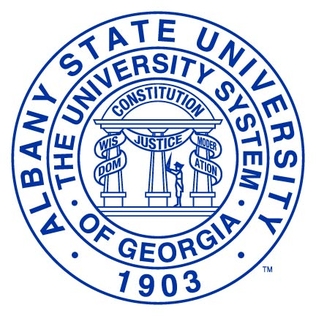
Albany State University (ASU) is a public historically black university in Albany, Georgia. In 2017, Darton State College and Albany State University consolidated to become one university under the University System of Georgia (USG). Albany State University has two campuses in Albany and a satellite campus in Cordele.
Richard Valeriani was an American journalist who was a White House correspondent and diplomatic correspondent with NBC News in the 1960s and 1970s. He previously covered the Civil Rights Movement for the network and was seriously injured when hit in the head with an ax handle at a demonstration in Marion, Alabama, in 1965 in which Jimmie Lee Jackson was shot and killed by Alabama State Trooper James Bonard Fowler.
The Albany Movement was a desegregation and voters' rights coalition formed in Albany, Georgia, in November 1961. This movement was founded by local black leaders and ministers, as well as members of the Student Nonviolent Coordinating Committee (SNCC) and the National Association for the Advancement of Colored People (NAACP). The groups were assisted by Martin Luther King Jr. and the Southern Christian Leadership Conference (SCLC). It was meant to draw attention to the brutally enforced racial segregation practices in Southwest Georgia. However, many leaders in SNCC were fundamentally opposed to King and the SCLC's involvement. They felt that a more democratic approach aimed at long-term solutions was preferable for the area other than King's tendency towards short-term, authoritatively-run organizing.
Harold Ray Garner, known informally as "Skip", is a biophysicist with research careers in plasma physics, bioengineering and bioinformatics. Garner was born in St. Louis, Missouri. He received his B.S. degree in Nuclear Engineering at the University of Missouri, Rolla in 1976 and a PhD in plasma/high temperature matter physics from the University of Wisconsin–Madison in 1982. He also holds an honorary professional engineering degree also from the University of Missouri, Rolla.

Sigma Sigma Phi, is the national osteopathic medicine honors fraternity for medical students training to be Doctors of Osteopathic Medicine (D.O.). The National Osteopathic Medicine Honors Fraternity is a group united in the interest of preserving the highest class of medical scholastic excellence and includes community service.

The Freedom Singers originated as a quartet formed in 1962 at Albany State College in Albany, Georgia. After folk singer Pete Seeger witnessed the power of their congregational-style of singing, which fused black Baptist a cappella church singing with popular music at the time, as well as protest songs and chants. Churches were considered to be safe spaces, acting as a shelter from the racism of the outside world. As a result, churches paved the way for the creation of the freedom song. After witnessing the influence of freedom songs, Seeger suggested The Freedom Singers as a touring group to the SNCC executive secretary James Forman as a way to fuel future campaigns. Intrinsically connected, their performances drew aid and support to the Student Nonviolent Coordinating Committee (SNCC) during the emerging civil rights movement. As a result, communal song became essential to empowering and educating audiences about civil rights issues and a powerful social weapon of influence in the fight against Jim Crow segregation. Rutha Mae Harris, a former freedom singer, speculated that without the music force of broad communal singing, the civil rights movement may not have resonated beyond of the struggles of the Jim Crow South. Their most notable song “We Shall Not Be Moved” translated from the original Freedom Singers to the second generation of Freedom Singers, and finally to the Freedom Voices, made up of field secretaries from SNCC. "We Shall Not Be Moved" is considered by many to be the "face" of the Civil Rights movement. Rutha Mae Harris, a former freedom singer, speculated that without the music force of broad communal singing, the civil rights movement may not have resonated beyond of the struggles of the Jim Crow South. Since the Freedom Singers were so successful, a second group was created called the Freedom Voices.
Everett Gendler was an American rabbi, known for his leadership of and involvement in progressive causes, including the civil rights movement, Jewish nonviolence, and the egalitarian Jewish Havurah movement. From 1978 to 1995, he served as the first Jewish Chaplain at Phillips Academy, Andover. He has been described as the "father of Jewish environmentalism".

Charles Melvin Sherrod was an American minister and civil rights activist. During the civil rights movement, Sherrod helped found the Albany Movement while serving as field secretary for southwest Georgia for the Student Nonviolent Coordinating Committee. He also participated in the Selma Voting Rights Movement and in many other campaigns of the civil rights movement of that era.
Chevene Bowers King was an American attorney, civil rights leader in Georgia during the Civil Rights Movement, and political candidate.
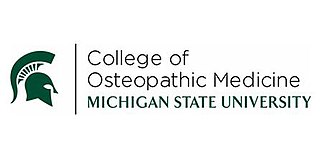
The Michigan State University College of Osteopathic Medicine (MSUCOM) is one of the two public medical schools of Michigan State University, a public land-grant research university in East Lansing, Michigan. The college grants the Doctor of Osteopathic Medicine (D.O.) degree, as well as a DO-PhD combined degree for students interested in training as physician-scientists. MSUCOM operates two satellite campuses in Clinton Township and Detroit. The college is accredited by the American Osteopathic Association's Commission on Osteopathic College Accreditation (COCA) and by the Higher Learning Commission.
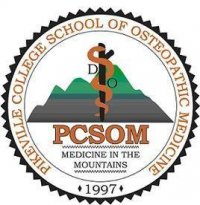
The University of Pikeville - Kentucky College of Osteopathic Medicine (UP-KYCOM) is the medical school of University of Pikeville, a private university affiliated with the Presbyterian Church (USA) and located in Pikeville, Kentucky. UP-KYCOM was established in 1997, grants the Doctor of Osteopathic Medicine degree. It is accredited by the Commission on Osteopathic College Accreditation (COCA) and the Commission on Colleges of the Southern Association of Colleges and Schools.
Laurie Pritchett was city Chief of Police in Albany, Georgia, best known for his actions in 1961 and 1962 suppressing the city's civil rights demonstrations by the Albany Movement.
This is a timeline of the civil rights movement in the United States, a nonviolent mid-20th century freedom movement to gain legal equality and the enforcement of constitutional rights for people of color. The goals of the movement included securing equal protection under the law, ending legally institutionalized racial discrimination, and gaining equal access to public facilities, education reform, fair housing, and the ability to vote.
Barbara Ross-Lee, D.O. is an American physician, academic, and the first African-American woman to serve as dean of a U.S. medical school; she is also known as the sister of Diana Ross along with being the aunt of actress Tracee Ellis Ross, and singer-songwriters Rhonda Ross Kendrick and Evan Ross. She majored in biology and chemistry at Wayne State University, graduating in 1965. Then, in 1969, she entered Michigan State University's College of Osteopathic Medicine. Ross-Lee then went on to open her own private family practice, teach as a professor, and hold other positions within the medical community. In 1993, she was elected as the first woman dean of a medical school, at Ohio University's Heritage College of Osteopathic Medicine. She has earned several awards and honors for her work and accomplishments.











